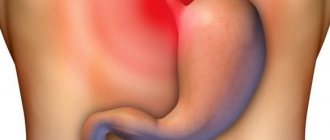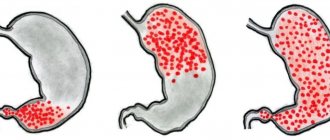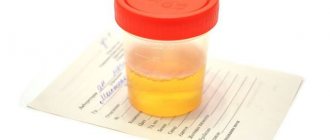Due to the widespread and effective use of NSAIDs in clinical practice by rheumatologists, cardiologists, and therapists and the fairly high risk of damage to the stomach and duodenum with complications, much attention is paid to the prevention of drug-induced injuries of the upper gastrointestinal tract. Treatment of the effects of drugs on the stomach is the topic of the article.
If even minor complaints from the gastrointestinal tract appear while taking NSAID medications, a stomach examination is indicated: esophagogastroduodenoscopy, determination of blood hemoglobin, stool examination for occult blood. In elderly people and people with chronic liver diseases, a study of liver enzymes is indicated.
Prevention of complications associated with the use of NSAIDs is carried out by two methods:
- transition to new, safer NSAIDs that have less effect on the gastric mucosa,
- the use of antiulcer drugs together with NSAIDs, which significantly reduce the risk of developing gastric damage (antisecretory drugs, gastroprotectors).
For the treatment and prevention of NSAID gastropathy, all the main modern antiulcer drugs are practically used with various effects, but also their side effects on various organs and systems of the body (enveloping, antacid drugs, bismuth salts, sucralfate, antisecretory drugs, synthetic analogues of prostaglandins).
Antisecretory drugs
H2 histamine receptor blockers - Ranitidine, Famotidine, etc., proton pump inhibitors PPI - Omeprazole, Rabeprozole, Rabeprozole-Pariet, Ecomeprazole-Nexium, etc. These drugs share the ability to suppress the production of hydrochloric acid and the enzyme pepsin in the cells of the stomach, thereby suppressing the aggressive factor of damage to the gastric mucosa. These properties determine the widespread use of these drugs for the treatment and prevention of erosive and ulcerative lesions of the gastric mucosa and gastrointestinal bleeding and ulcer perforation.
However, the use of these drugs for a long time causes digestive disorders in the stomach and atrophy of the gastric mucosa. Persistent and long-term suppression of gastric secretion can cause changes in the gastric epithelium, up to the development of gastric adenocarcinoma.
Nevertheless, the good preventive effect of the drugs, the convenient form of administration, and the possibility of long-term administration of PPI maintenance therapy at half the dose have made them the drugs of choice in the treatment and prevention of NSAID-gastropathy.
Considering the cause and mechanism of damage to the gastric mucosa in patients with and without risk factors, it is necessary to use agents that have a gastroprotective (protective and restorative) effect on the mucous membrane, without waiting for the development of serious symptoms of NSAID gastropathy.
Protection that doesn't help
Some patients believe that it is not worth spending money on gastroenteroprotectors when you can protect the stomach with simple home remedies. Unfortunately, the protective effect is insufficient. Do not try to replace a drug prescribed by a doctor with traditional methods, which include:
- semi-liquid porridge, jelly, decoctions of various plants;
- using rectal forms of the drug instead of oral ones - the drug will still penetrate into the blood, and then reach the stomach wall and block cyclooxygenase;
- taking sorbents or antacids - smecta, Maalox, Rennie, etc.
It should be remembered that most drugs have side effects, and the negative effects of non-steroidal anti-inflammatory drugs today can only be stopped by gastroenteroprotective drugs.
Back to list Previous article Next article
Self-medication delays seeing a doctor
It is most dangerous to take painkillers on your own for more than 1-2 doses, and delay treatment if the child has abdominal pain, vomiting and diarrhea. Painkillers mask the picture of the disease and it will be difficult for the doctor to decide on the necessary treatment tactics or the need for emergency surgery if he examines the patient after taking such a drug. The process will continue to develop at this time and this will lead to a delay in emergency care. Self-administration of anti-diarrhea medications is also not harmless.
“It is dangerous to take medications on your own that stop motor skills,” says Evgenia Mayevskaya. “If you take them for infectious diarrhea, the toxins are “locked” inside the intestines and you can get complications, including toxic shock. Therefore, if the cause of diarrhea is unknown, for example, loperamide should not be used - this can actually worsen the person’s condition. In such a situation, only taking sorbents is safe.”
Also, doctors do not recommend taking medications for constipation on your own due to their strong effects.
“After taking certain medications, constipation is difficult to treat, plus there may be disturbances in the microbial community and serious changes in the colon mucosa, for example, melanosis of the colon,” warns Mayevskaya.
If the doctor prescribed many medications
The Greek word "polypharmacy" means "multiple actions." In pharmacology, it describes a situation where a patient takes four or more medications at the same time. Is this really necessary? Does such a rich complex heal or, rather, cripple?
Depth of the problem
Having worked in a pharmacy for many years, I have encountered hundreds, perhaps thousands, of prescriptions. They differed from each other in content, but the filling density of most prescription forms was similar: the average recipe leaves almost no empty space. Prescriptions in which one or two medications appear are a happy exception to the rules established by someone unknown. And polypharmacy—the simultaneous combination of several medications—is quite common.
Official Western statistics state that 44% of men and 57% of women over the age of 65 take more than 5 medications, and about 12% take more than 10 medications per week. It is almost impossible to provide figures reflecting the state of affairs in Russian medicine. Our doctors write out prescriptions not only on special forms, but also on scraps of paper and pages from a notebook. And this means that accurately calculating how many patients receive a medicinal “cocktail” of many ingredients is an impossible task.
And although, without knowing the numbers, it is impossible to directly accuse domestic doctors of a tendency to overmedicate, nevertheless, any practicing pharmacist will confirm: Russian polypharmacy is far from limited to elderly patients.
It targets patients with sore throats and common colds, as well as children and pregnant women. This phenomenon has become firmly established in clinics and inpatient rooms. What are the consequences of overuse of medications?
Too many medications are not always good
Every drug, regardless of its composition and effect on the body, may have side effects. By increasing the number of medications in the treatment regimen, we also increase the likelihood of adverse events. However, we must not forget that medications can also interact with each other!
Pharmacologists and doctors easily predict the reaction between two or even three drugs. But when a dozen drugs end up in one long-suffering stomach, the result becomes difficult to predict. The resulting products may have new side effects, and the test subject is an already unhealthy person.
Polypharmacy has also been shown to increase the likelihood of falls in old age. The use of more than four cardiovascular, nootropic and psychoactive, that is, acting on the central nervous system, drugs is associated with a constantly accumulating risk of falls. Don't forget that falling in old age, especially for women, can result in serious injury. And if a healthy person, who sprained his leg while walking quickly, immediately forgets about it, then a patient with osteoporosis will contemplate the limb “packed” in snow-white plaster for several more months.
An older woman taking only five heart medications may not attribute her increased falls to her drug therapy. But the doctor not only can, but also must foresee this.
Risk category: children and pregnant women
The prescription of a lot of drugs to older people is easy to explain. Usually, people who have reached an advanced age have several chronic diseases behind them, each of which requires treatment. But how can we mentally comprehend polypharmacy in relation to children and pregnant women?
When you go to a children's clinic with ARVI, you receive a list of five or even more medications. Antiviral, antipyretic, expectorant, interferons, vitamins, local anesthetics, immunomodulators and so on - there is no limit to imagination. According to Russian pediatricians, the average child under one year of age takes 5.5 medications, and older children can eat a dozen different tablets and syrups at certain intervals.
The situation in obstetrics is not much better. Despite the fact that the effect of many medications during pregnancy has not been studied enough, medications are prescribed without skimping. Over the past 30 years, the number of pregnant women taking more than four medications at the same time has increased by more than 30%!
Already in the first, most important trimester, many women with a normal pregnancy take multivitamins, calcium supplements, progesterone, sedatives and antispasmodics. In more serious periods, the amount of drugs absorbed only increases. Meanwhile, leading experts recommend limiting yourself to one single drug - folic acid. The remaining medications must be taken strictly according to indications.
Protect yourself. Guide to action
Drug terror, which is thriving in modern domestic medicine, can affect everyone. And although it is not easy to protect yourself and your children from a host of unnecessary medications, but, speaking through the lips of Verochka from “Office Romance,” nothing is impossible for a person with intelligence.
Having received an impressive list of medications from the doctor’s hands, remember that the prescription of each item must be justified. Feel free to clarify what the drugs in your prescription are needed for. Do not leave the doctor's office until you are sure that polypharmacy in your case is a necessity and not an excess.
If you cannot do without complex treatment, help the body cope with significant drug loads and overcome the current illness, and not develop a new one. Therefore, do not forget about the three rules.
- Honesty with the doctor.
Be sure to tell your doctor what medications you are already taking. - Scrupulousness in taking medications.
Write down (and don’t hesitate to ask your doctor) how, how much and when to take the drug. And after writing it down, don’t be creative in the process. For example, when you wash down a capsule of medicine on the go with scalding coffee, you may not realize that the gelatin capsule easily dissolves in hot water. The medicine, no longer protected by the capsule, is destroyed in the stomach without reaching its destination - the intestines, and the desired effect takes an indefinitely long time to arrive. - Responsibility to yourself.
Do not stop the course ahead of schedule just because “it has become easier,” and do not change therapy because there were only a couple of tablets missing from the package. Just one missed day during antibiotic treatment and resistant strains of bacteria that you created grow in your body and are not so easy to fight.
Therefore, trust your doctor and find out the information intended for patients. Be pedantic when checking the dose and rules for using medications - medicine does not tolerate negligence. And then the treatment will be beneficial, and not vice versa.
Marina Pozdeeva
Photo thinkstockphotos.com
Prevention of stomach and high acidity
To normalize the functioning of the gastrointestinal tract and eliminate high acidity, you should know what to take for preventive purposes.
Almagel
The medication is produced in the form of a suspension; it is recommended to drink for ulcers, gastritis, heartburn, stool problems, and severe pain.
You can take it periodically half an hour before meals. The dosage, depending on age, varies from 5 to 15 ml.
Gevikson
Available in powder or suspension form. For preventive purposes, take 15 ml after meals no more than four times a day. The drug should not be used for more than ten days of continuous use.
Gastal
The medicine may have various flavorings; the tablets are sold in packages. Take one tablet after meals four times a day. Treatment should not exceed more than two weeks.
Rennie
Absorbable tablets should be taken no more than three times a day if heartburn bothers you or if there is discomfort in the stomach. The medication can be used for ten days.
Maalox
The dosage of the suspension is 15 and 30 ml. Maalox is taken one hour after meals. If heartburn occurs, you can drink it immediately. Continuous use of the drug should not exceed one month.
Prevention of gastrointestinal diseases primarily restores the acid-base balance. Along with taking medications, it is not a bad idea to stick to a diet.
Alcoholic drinks, caffeine, soda, and foods containing salt and vinegar should be excluded from your daily diet. During the period of following the diet, which should last at least one month, you need to:
- have a good breakfast;
- eat vegetable soup for lunch;
- For dinner you can cook meat or stew vegetables.
The daily nutritional intake should include 4 to 5 meals. You can consume dairy products whose fat content does not exceed 3%.









